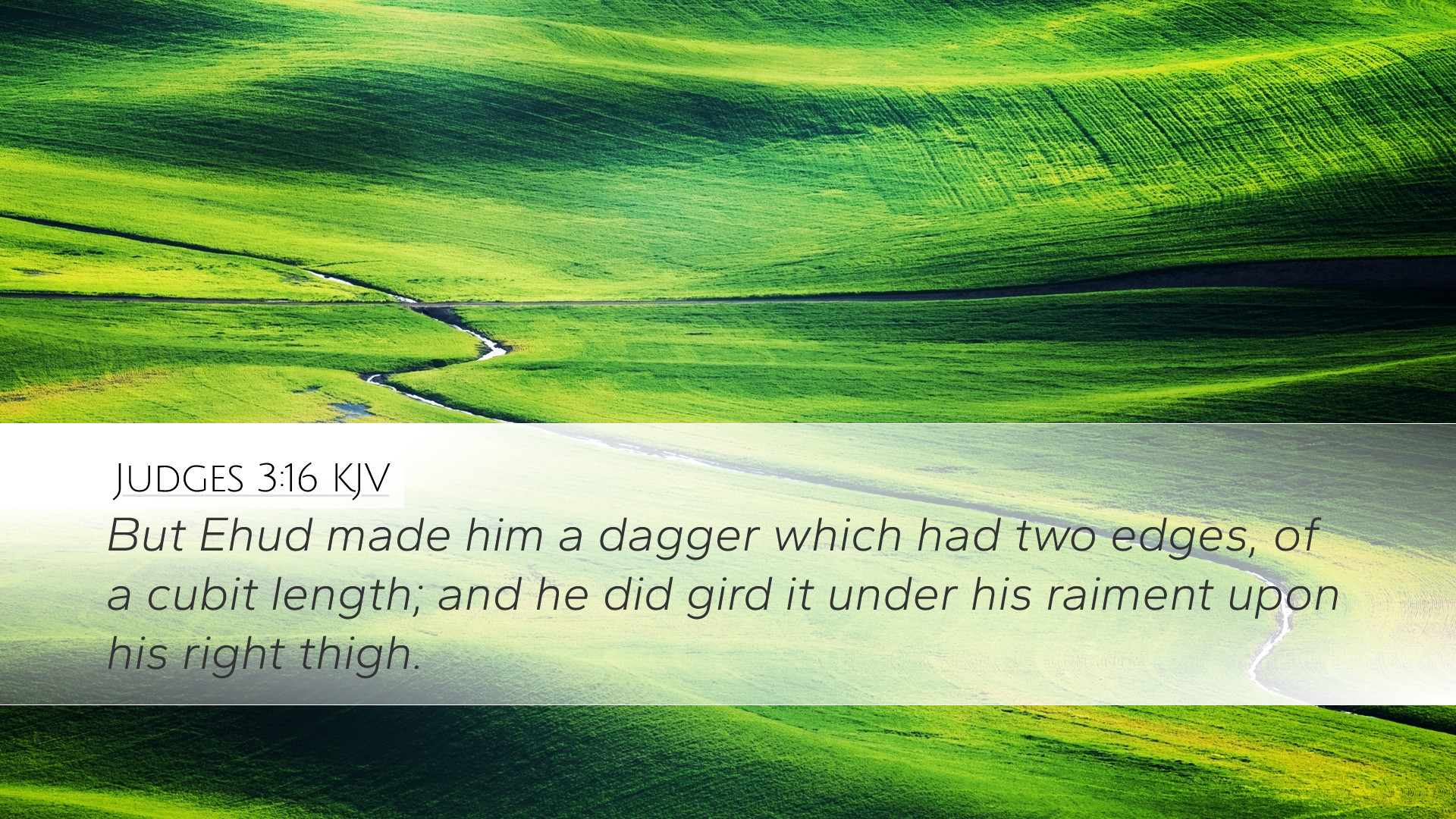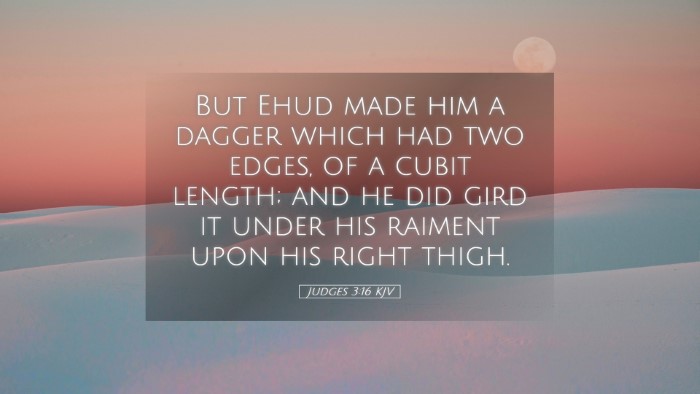Commentary on Judges 3:16
Verse: Judges 3:16 - "But Ehud made him a dagger which had two edges, of a cubit length; and he did gird it under his raiment upon his right thigh."
Introduction
This verse introduces Ehud, a critical character in the narrative of the Book of Judges, emphasizing his cunning and resourcefulness. The creation and concealment of the dagger symbolize a pivotal moment in Israel's deliverance from Moabite oppression. In studying this passage, we gain insight into the themes of divine providence, courage, and the socio-political context of Israel during the period of the judges.
Historical Context
The Book of Judges recounts a time when Israel was a loose confederation of tribes rather than a unified kingdom. Following Joshua's leadership, the Israelites faced threats from surrounding nations, particularly the Moabites. The oppression under Eglon of Moab served as a divine judgment due to Israel's repeated disobedience.
Ehud as a Deliverer
Ehud emerges as a deliverer, called by God to free Israel from the yoke of Moab. His ingenuity in crafting the dagger is noteworthy; it represents his strategic mind and commitment to the task at hand. This highlights the overall theme found in Judges, where God raises unconventional leaders in desperate times.
The Significance of the Dagger
Two-Edged Dagger: The description of the dagger being two-edged implies its lethal potential. In biblical literature, the number two often signifies pairings or duality, which could symbolize the duality of judgment and mercy in God's dealings with His people.
- Symbol of Cunning: The dagger functions as a symbol of Ehud's cunning and ability to use available tools for God's purpose.
- Instruments of Justice: The weapon's creation serves as a metaphor for God's justice, showcasing how divine power can manifest through human actions.
Spiritual Insights
From a spiritual perspective, the act of girding the dagger signifies preparation and readiness. It serves as a reminder for believers to be equipped with the tools necessary for spiritual warfare.
The Role of Preparation
Just as Ehud prepared himself for a divine mission, so too are Christians called to prepare themselves through prayer, the Word, and righteous living.
Commentary Insights
Matthew Henry
Henry emphasizes that Ehud’s craftsmanship signifies not just physical readiness but also spiritual insight. He notes that "the weapon that he fashioned was a means of deliverance for Israel, showcasing God's providential arrangements." Henry further illustrates how Ehud’s actions underscore the importance of being zealous for God's glory, invoking the thought that believers ought to be as resolute in confronting evil.
Albert Barnes
Barnes provides a detailed examination of the dimensions of the dagger, noting that its length was intended for concealment. He elucidates the point that God often uses the unexpected or seemingly insignificant means to enact His will. Barnes connects this to the New Testament’s portrayal of spiritual weaponry, emphasizing that believers must also consider the sanctity of their motives and readiness.
Adam Clarke
Clarke addresses the significance of Ehud's physical stature and left-handedness, arguing that God often uses those whom society overlooks or undervalues. He posits that the act of hidden preparation is vital, as it exemplifies how God equips the faithful with the means to accomplish His will amid adversity.
Conclusion
Judges 3:16 serves as more than just a narrative detail; it embodies larger themes that resonate throughout Scripture. Ehud's readiness to act underscores God's sovereignty in using unlikely instruments for His divine purposes. As pastors, students, and scholars reflect on this passage, may they recognize the call to prepare, act, and trust in God's providences, bringing His deliverance to a world in need.
Reflection Questions
- In what ways can we prepare ourselves for the tasks God has set before us?
- How can we remain vigilant, like Ehud, in pursuing justice in our communities?
- What insights can we draw regarding God's choice of unlikely leaders throughout biblical history?


